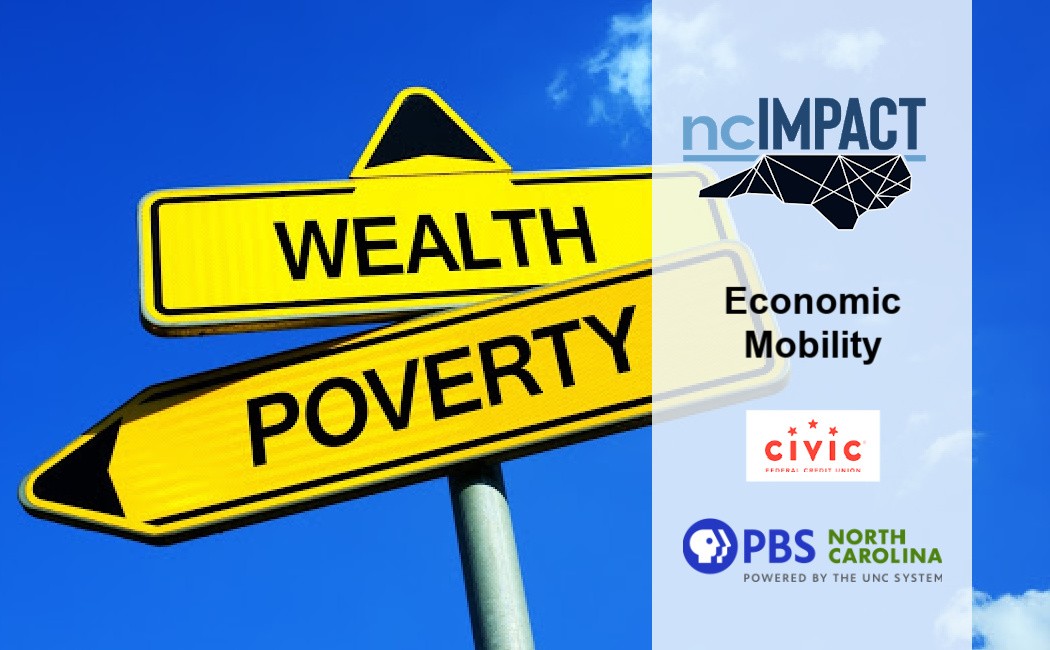Economic Mobility (Blog)
COVID-19 exacerbated many existing issues related to the economic mobility gap, such as low-income employment, education, and small business closures. Charlotte Open for Business is a two-phase approach to both recovery from COVID-19 and strengthening the business community beyond the pandemic.

The Challenge
The American Dream has long inspired individuals in the United States. Part of the American Dream is represented by the term “economic mobility,” or the ability of individuals to improve their economic status. Raj Chetty of Harvard University advanced understanding of economic mobility in the United States as compared to other countries, as well as the geographic distribution of economic mobility levels within the nation. His study, Where is the Land of Opportunity? The Geography of Intergenerational Mobility in the United States, revealed jarring information about the Charlotte metropolitan area: Charlotte ranked 50th of the 50 largest metropolitan areas studied regarding upward economic mobility for children. The study examined the likelihood that a child born into the lowest 20% income bracket would rise to the highest 20% of income bracket in adulthood.
In response to these findings, the Charlotte-Mecklenburg Opportunity task force conducted a study of their own to investigate why Charlotte might have such poor economic mobility, and make recommendations to change the situation. They focused on how inheriting intergenerational poverty impacts children’s lives. Through their research they identified three major determinants in the economic mobility system and two cross-cutting factors that influence those determinants. The determinants are early care and education, college and career readiness, and family and child stability. The two cross-cutting factors are the impacts of segregation and structural racism, and social capital. In an episode of ncIMPACT, David Williams, Director of Policy Outreach from Opportunity Insights explains that COVID-19 exacerbated many of the existing issues related to the economic mobility gap, such as low-income employment, education, and small business closures.
Source: The Charlotte-Mecklenburg Opportunity Task Force Report
The Solution
Charlotte engaged in a wide variety of solutions in response to the task force report and shifted their focus to recovery in light of the COVID-19 pandemic. One approach was the Charlotte Open for Business program, established in April of 2020. Charlotte Open for Business is a two-phase approach to both recovery from COVID-19 and strengthening the business community beyond the pandemic. The first phase, “Survive,” provided programs supporting small businesses and assisting in initial reopening. The Open For Business Directory highlights open businesses in Charlotte and provides those businesses with information about new resources or access to financial support. They provided access to capital programs and small business partner support grants, and the Resilient ReUp Program provided small businesses with training for response and resilience during and after COVID-19.
The second phase, “Thrive,” is about creating resiliency in businesses and the workforce. Charlotte provided several workforce programs through Open for Business including the Thrive Hiring Grant Program and the Renewable Energy and Efficiency Workforce (RENEW) Training Program. The Thrive Hiring Grant Program provides mid-sized businesses with monetary incentive to hire multiple employees ($5,000 award per employee hired during the allotted time), which can help to address Charlotte unemployment. The RENEW Training Program is a 13-week training program in heating, ventilation, and air conditioning (HVAC) and electrical trades, which is a high-demand sector.
James Thamm’s U.S. Taekwondo was one of the Charlotte small businesses that benefited from Charlotte Open for Business support.
The Players
The Charlotte City Council assembled the Community Recovery Task Force to guide support and recovery efforts for the COVID-19 pandemic. The City established the Charlotte Open for Business program and partnered with outside organizations to provide workforce programs such as the RENEW Training Program, offered in partnership with the Urban League of Central Carolinas. Leading on Opportunity is the organization created to respond to the Charlotte-Mecklenburg Opportunity Task Force research and recommendations.
The Promise
Charlotte Open for Business focuses on the long-term impacts of COVID-19 and addressing them in the context of economic mobility. The strategy focuses on the career readiness aspect of the opportunity system, while supporting existing businesses through the pandemic. The UNC School of Government provided guidance on similar programs to the Thrive Hiring Grant Program so other local governments may know how they could provide hiring incentives for local businesses.
Just before the COVID-19 pandemic began, the Brookings Institution released the 2020 Metro Monitor Report, which examined the successes and areas of growth remaining for metropolitan areas across the nation. At that time, the Charlotte metropolitan area documented a large improvement in the overall growth and prosperity categories, but still needed to improve in the overall inclusion and racial inclusion categories. The two types of inclusion examine changes in unemployment, median income, and relative poverty for the overall population and the subgroups of white residents and residents of color. Charlotte ranked 24th of the 53 large metropolitan areas for overall inclusion, and 31st for racial inclusion. While work remains, the improvements made are promising for the future of economic mobility in the Charlotte region.


